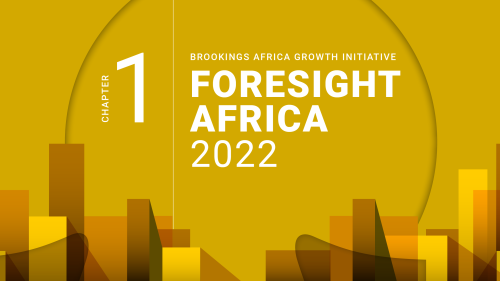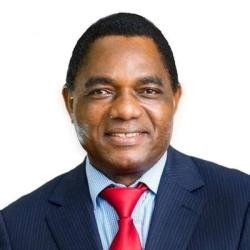Below is a viewpoint from the Foresight Africa 2022 report, which explores top priorities for the region in the coming year. Read the full chapter on Africa’s economic recovery.
 The year 2021 has been a landmark year for Zambia. Two important events occurred. The passing of the first president of independent Zambia, Dr. Kenneth Kaunda, was mourned in June. Then, in the election in August 2021, the people of Zambia voted decisively for change.
The year 2021 has been a landmark year for Zambia. Two important events occurred. The passing of the first president of independent Zambia, Dr. Kenneth Kaunda, was mourned in June. Then, in the election in August 2021, the people of Zambia voted decisively for change.
I mention the passing of Dr. Kaunda because Zambia has strong roots. He was a person who sought to serve ordinary Zambians and, even if some of the policy decisions his party made did not have optimal outcomes, his intention was to place ordinary Zambians at the center of the country’s development.
Sadly, Zambia has not lived up to its promise. Over the last decade, we have witnessed the erosion of our economy and the corruption of our politics. As a consequence, our debt has risen to unsustainable levels, reducing the country’s capacity to invest in productive areas of our economy and its ability to address the gaps in health care, education, and other social services.
Our national budget has been overwhelmed by debt servicing, emoluments, and consumption, when there should have been greater room for investment and growth.
The scourge of corruption has eroded our much-needed resources including the debt itself, robbing us further of the opportunity for growth.
This slide towards debt, disaster, and dependency set our country on a bleak course.
Fortunately, the people of Zambia that decided to change direction and the election—notably under difficult COVID-19 conditions—saw a change of government and the opportunity for a new beginning.
Zambia’s transition is an example of Africa’s success in addressing its own challenges: The African Union played an instrumental role in ensuring our smooth transfer of power.
It was our third peaceful, democratic transfer of leadership since the advent of multi-party democracy three decades ago. It was an African success.
Notably, Zambia’s transition is an example of Africa’s success in addressing its own challenges: The African Union played an instrumental role in ensuring our smooth transfer of power.
This transition also sends a clear message that Africa embraces the right to democratic choice. It comes after the historic stand taken by the courts in our neighbor, Malawi, where a rigged election outcome was rejected, and new elections were successfully held in 2019.
In both these cases, it was Africans who held the election, contested it, and adjudicated on its fairness. We can say with pride that Africans own democracy on the continent.
The road ahead will not be without challenges but, with a clear vision and plan, and with relentless determination, we will deliver on the aspirations of our people.
My administration’s focus over the next five years will be on restoring macroeconomic stability and promoting the growth of the economy.
We will pay special attention to lowering the fiscal deficit, reducing public debt, and restoring social and market confidence. We will also promote national unity and good governance by strictly adhering to the rule of the law and democratic accountability.
Our priority is a simple one: We must find a way to include the jobless youth in our economy. In order to do that, we need to build our economy by encouraging new investment and giving our young people the skills they need to participate fully in the economy.
Growing the economy requires agile thinking that uses all the levers at our disposal. We must urgently attend to restoring our mining sector to its rightful place as a leading global producer of copper by ensuring regulatory fairness and attending to obstacles that stand in the way of new investment. We must strive to increase the production of copper and other minerals so that Zambia can reclaim its place as one of Africa’s leading mining countries.
We need to make Zambia a preferred investment destination by cutting red tape and reducing policy uncertainty which cause investors to hesitate.
Our priority is a simple one: We must find a way to include the jobless youth in our economy.
We must encourage the growth of new businesses. We need 1,000—perhaps even 10,000—entrepreneurs to bloom, igniting our small business sector as a key employer and source of innovation and growth.
To do this, we must make it easier for small businesses to gain access to capital. Government must understand the challenges that entrepreneurs and investors face, and do its part to welcome investment, growth, and innovation.
None of this will happen without clean and purposeful governance. The institutions mandated to investigate and prosecute will be given unfettered autonomy to act without fear or favor and without political bias. Malpractice and mismanagement must be rooted out.
From the election to economic recovery, Zambia’s success will, in this way, be Africa’s success.




Commentary
Zambia’s success will be Africa’s success
January 21, 2022